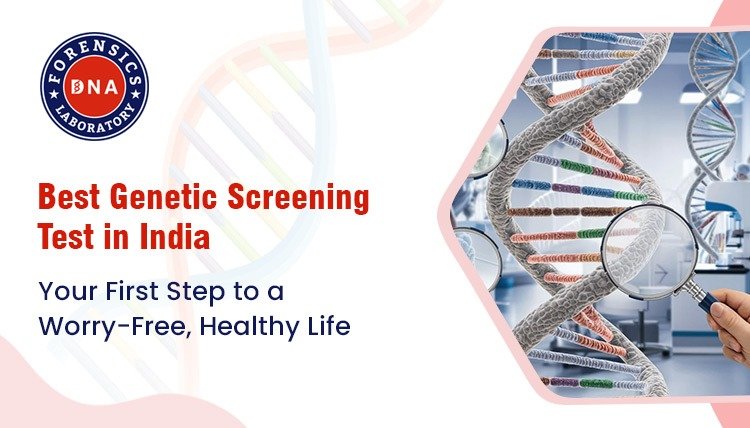Did you know?
Your DNA isn’t just responsible for your eye & hair color, but much more.
Yes, that’s right! Your DNA and the genes within critically affect your general health and well-being. In many cases, these genes are also responsible for the manifestation of inherited diseases in a human being. Gut health, skin health, immunity, weight, and glucose metabolism are some of the aspects of your health that are affected by genes. And we all know that many types of cancers are hereditary. This is so because the cancer-causing, or carcinoma, genes are transferred from one individual to their offspring.
A Genetic Screening Test comes in handy in such cases, where a high-risk individual can assess their specific health risk. Moreover, specialized genetic tests, like the DNA Wellness Test, can also provide valuable information about how your body responds to diet, exercise, detoxification, etc.
Types of Genetic Tests to Choose
You can choose from the following types of genetic screening tests to assess your risk for various health conditions.
1. DNA Wellness Test:
DNA Wellness Test is a specialized genetic test that analyzes your genetic markers related to fitness, weight, diet, and detoxification. Its report helps you gain vital information about and optimize your health.
2. Skin Care DNA Test:
This test evaluates your risk of skin disorders, like premature aging, glycation & pollution effect, acne, cellulite formation, and more. By understanding your genetic predisposition, you can choose skincare products and routines that align with your specific needs.
3. DNA Sleep Test:
The DNA Sleep Test analyzes various genetic factors that influence sleep patterns and your susceptibility to sleep disorders. Risk of sleep problems, like insomnia, narcolepsy, restless leg syndrome (RLS), sleep apnea, etc., can be assessed with this test.
4. Kidney Health DNA Test:
This genetic test assesses your risk for kidney-related diseases, including kidney stones, high uric acid. It also assesses your risk for critical kidney conditions, like Childhood Steroid Sensitive Nephrotic Syndrome, Autosomal Dominant Polycystic Kidney Disease, nephropathy, etc.
5. DNA Immunity Test:
The DNA Immunity Test analyzes genetic factors that influence your immune system’s ability to defend against infections. It provides detailed insights into how your body responds to pathogens and can help optimize your immune health. This, in turn, can help reduce your risk of infections and autoimmune conditions by optimizing your diet & lifestyle.
6. Genetic DNA Autoimmune Disease Test:
This test identifies genetic markers linked to autoimmune diseases like rheumatoid arthritis, lupus, and multiple sclerosis. The report of your Autoimmune Disease Test lets you understand your genetic predisposition to these conditions. With this information, you can take proactive steps in consultation with your healthcare provider to strategize an effective prevention and treatment plan.
7. Genetic Tests for Inherited Eye Diseases:
This genetic test assesses your risk for inherited eye diseases like Glaucoma, Cataract, Diabetic Retinopathy,Macular Degeneration, etc. Early genetic screening allows for timely assessment and medical intervention.
8. Cardiometabolic Risk Assessment Genetic Test:
This test analyzes genetic factors responsible for cardiovascular diseases, like Type II Diabetes, etc. By identifying these susceptibilities, this test enables early intervention, dietary and lifestyle modifications, and preventive care strategies to reduce the risk.
9. Hypertension Pharmacogenomic Panel Test:
The Hypertension Pharmacogenomic Panel Test examines genetic susceptibility to blood pressure medications. This test report helps your doctor determine the most effective medication for you.
10. Hereditary Cancer Genetic Test (Germline Mutation Test):
This test screens for inherited mutations in genes like BRCA1, BRCA2, and others, which are linked to higher risks of specific cancer types. These include
- Breast cancer
- Ovarian cancer
- Prostate cancer
- Colorectal cancer
- Pancreatic cancer
- Melanoma (Cancer of Melanocyte cells)
Early detection can empower you and your healthcare provider to prepare a suitable prevention and treatment plan in advance.
11. BRCA 1 & 2 Gene Tests (For Breast & Ovarian Cancers):
The BRCA1 and BRCA2 genetic tests screen for mutations in these two genes, which significantly increase the risk of breast and ovarian cancers.
Early identification of these mutations allows for timely screening protocols, improves the chances of prevention, and determines the right treatment strategy.
By undergoing these genetic screening tests, individuals can gain deeper insights into their genetic health risks and take proactive steps toward maintaining optimal health, managing risks, and making lifestyle changes tailored to their genetic makeup.

Who Should Get a Genetic Test?
Genetic tests are not just for people with a family history of a genetic disease but for everyone. This is so because a disease-causing gene may lay dormant in the family line for generations before expressing itself randomly.
Therefore you should get these tests, even if you don’t have a history of a health problem in the family. The following points emphasize on the need for these tests based upon an individual’s specific requirement or preference.
1. People with a family history of inherited conditions like cancer, heart disease, or neurological disorders may consider genetic screening to assess their risk.
2. Couples planning to have children can undergo genetic testing to identify potential hereditary risks for their offspring.
3. Those with chronic conditions like diabetes, hypertension, or obesity may benefit from genetic testing to better understand their genetic predisposition and manage their health.
4. Individuals looking to optimize their lifestyle, diet, and fitness based on their genetic profile may find genetic screening useful for personalized health strategies.
5. People experiencing unexplained symptoms related to a genetic disorder can use genetic testing for early diagnosis and targeted treatment.
6. Those with autoimmune diseases or related symptoms can use genetic screening to assess their genetic risk and tailor their treatment approach.
7. Individuals with a family history of cancer can benefit from genetic testing to assess their own risk and take proactive measures for prevention.
8. People living or working in high-pollution environments may use genetic screening to understand how their genes affect their susceptibility to pollution-related health issues.
DNA Forensics Laboratory Pvt. Ltd. – For Accurate & Actionable Genetic Screening Test
DNA Forensics Laboratory Pvt. Ltd. is one of India’s leading providers of accredited peace of mind DNA tests. They are the only private DNA testing company in India, providing Legal DNA Tests for honorable courts of law.
Here, we remain to be the ideal choice for you to get your Genetic Test from. We are providing all of the above mentioned Genetic Tests.
With vast experience, equipped with the latest technology, and highly qualified and experienced staff & scientists. This helps us ensure your test’s accuracy and the authenticity of your report.
Your genetic screening report can help your dietician/nutritionist lay out a personalized diet plan for you to stay healthy. Besides, your genetic testing report can help your doctor assess your risk of a specific disease or health problem. With this date, he/she can prepare an effective prevention & treatment plan in advance.
So what are you waiting for? Get in touch to learn more about any of our genetic testing services, or book your test straight away.






















